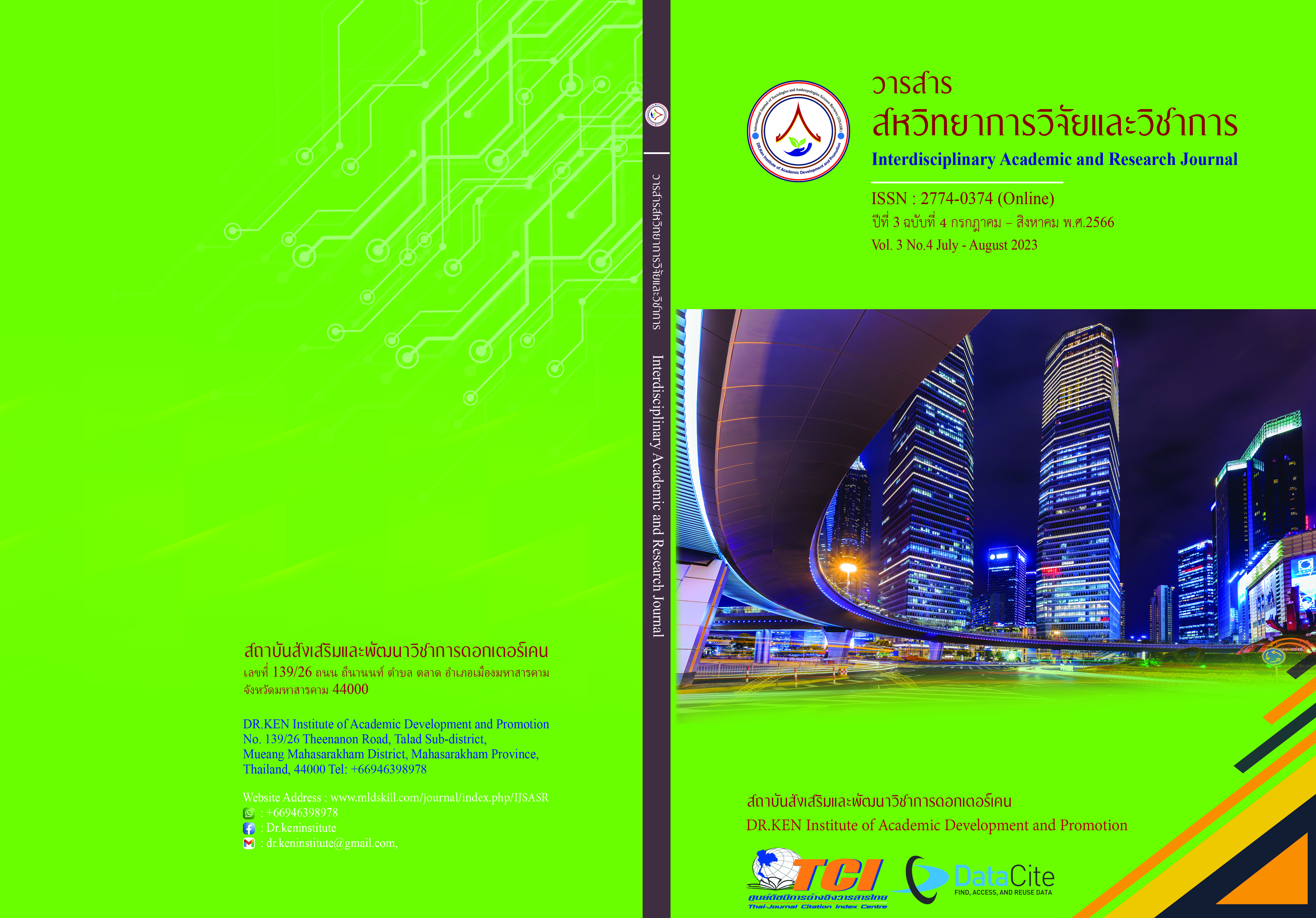Situational Leadership of Scholl Administrators According to the Perception of the Teachers in Demonstration Schools Affiliated with Autonomous University in Bangkok
DOI:
https://doi.org/10.14456/iarj.2023.179Keywords:
Situational Leadership; , School Administrators; , Demonstration School Affiliated with an Autonomous UniversityAbstract
Regarding educational administration, school administrators are considered a significant driving force in finding ways to deal with every situation that arises. They must have a role in developing a successful organization. They must determine the vision, goals, and missions, and uses diverse strategies to create cooperation in planning various actions to achieve the desired goals in the changing situation continually and efficiently. The purposes of this research are to: (1) to study the situational leadership of school administrators according to the perception of the teachers in demonstration schools affiliated with autonomous universities in Bangkok (2) to compare the situational leadership of school administrators according to the perception of the teachers in demonstration schools affiliated with autonomous universities in Bangkok, based on level of education, age, and work experience. The sample group was 291 teachers using Cohen’s sample size table, specified at the statistical significance .05. Data were collected by questionnaires of 27 items with an Index of the item - Objective Congruence (IOC) valued at 0.80 - 1.00. Discrimination power was between 0.24-0.81 and reliability was at 0.921. Statistics used to analyze the data were frequency, percentage, mean, standard deviation, T-test for independent samples, and One Way ANOVA. When a statistically significant difference was found at .05, comparisons shall be made by Scheffe's post hoc comparisons method. The findings reveal that: (1) The perception of the teachers on situational leadership of School administrators in demonstration schools affiliated with autonomous universities in Bangkok, both overall and in each aspect, was at a high level, based on the highest to the lowest of each aspect as follows: selling, participating, delegating and directing respectively. (2) The perception of the teachers, with different degrees, ages, and work experience, on situational leadership of school administrators in demonstration schools affiliated with autonomous universities in Bangkok, both overall and in each aspect, can be summarized as follows: (2.1) The perception of the teachers, with different degrees, on situational leadership of School administrators in demonstration schools affiliated with autonomous universities in Bangkok, both overall and each aspect, had no difference. (2.2) The overall perception of the teachers, at different ages, on situational leadership of School administrators in demonstration schools affiliated with autonomous universities in Bangkok was at the statistically significant level of .05. (2.3) The overall perception of the teachers, with different work experiences, on situational leadership of School administrators in demonstration schools affiliated with autonomous universities in Bangkok had no differences.
References
ซอฟี ราเซะ. (2560). ภาวะผู้นำของผู้บริหารโรงเรียนในอำเภอทุ่งยางแดง สังกัดสำนักงานเขตพื้นที่การศึกษา ประถมศึกษาปัตตานี เขต 3. การค้นคว้าอิสระครุศาสตรมหาบัณฑิต: มหาวิทยาลัยราชภัฏยะลา.
ดาราวดี บรรจงช่วย. (2560). ภาวะผู้นําของผู้บริหารสถานศึกษาตามการรับรู้ของครูสังกัดสำนักงานเขตพื้นที่การศึกษา เขต 11 ในจังหวัดชุมพร. การค้นคว้าอิสระครุศาสตรมหาบัณฑิต: มหาวิทยาลัยราชภัฏสุราษฎร์ธานี.
ตระกูลพันธ์ ยุชมพู, โสภา อํานวยรัตน์, สันติ บูรณะชาติ และน้ำฝน กนมา. (2563). รูปแบบการบริหารโรงเรียนสาธิตที่มีประสิทธิผล สังกัดมหาวิทยาลัยในกำกับของรัฐ. วารสารศึกษาศาสตร์ มหาวิทยาลัยทักษิณ. 20 (2), 183-196.
ธนากร แก่นเกษ. (2560). ภาวะผู้นําเชิงสถานการณ์ของผู้บริหารโรงเรียนมัธยมศึกษาใน จังหวัดจันทบุรี สังกัดสำนักงานเขตพื้นที่การศึกษามัธยมศึกษา เขต 17. งานนิพนธ์การศึกษามหาบัณฑิต: มหาวิทยาลัยบูรพา.
ธร สุนทรายุทธ. (2556). พฤติกรรมเชิงการเมืองในองค์กร: จริตและจริยกรรมของคนองค์กรภาครัฐและ เอกชน. กรุงเทพฯ: เนติกุลการพิมพ์.
ธัญพร ตันหยง, สุรีย์มาศ สุขกสิ, อัมพวัน ประเสริฐภักดิ์. (2561).การศึกษาบทบาทภาวะผู้นำตามสถานการณ์ของผู้บริหารสถานศึกษา สังกัดสำนักงานเขตพื้นที่การศึกษาประถมศึกษาจันทบุรี. วารสารวิจัยรำไพพรรณี. 12 (1), 125-131.
บัญชา บุญบํารุง. (2561). ความสัมพันธ์ระหว่างภาวะผู้นําเชิงสถานการณ์กับประสิทธิภาพ การปฏิบัติงานของข้าราชการครูโรงเรียนในสังกัดสำนักงานเขตบางเขน กรุงเทพมหานคร. วิทยานิพนธ์ศึกษาศาสตรมหาบัณฑิต: มหาวิทยาลัยเทคโนโลยีราชมงคลธัญบุรี.
วรวรรณ ดวงเทศ. (2565). การศึกษาภาวะผู้นําตามสถานการณ์ของผู้บริหารสถานศึกษา สหวิทยาเขตริมกก สังกัดสำนักงานเขตพื้นที่การศึกษามัธยมศึกษาเชียงราย. การศึกษาค้นคว้าด้วยตนเองศึกษามหาบัณฑิต: มหาวิทยาลัยพะเยา.
สันติ สุขสัตย์. (2561). ปัจจัยเชิงสาเหตุที่ส่งผลต่อประสิทธิผลของโรงเรียนสาธิตสังกัดสำนักงานคณะกรรมการการอุดมศึกษา. ดุษฎีนิพนธ์ปรัชญาดุษฎีบัณฑิต: มหาวิทยาลัยบูรพา.
สำนักงานปลัดกระทรวงอุดมศึกษา วิทยาศาสตร์ วิจัยและนวัตกรรม. (2565). โรงเรียนสาธิต ปีการศึกษา 2565 ภาคเรียนที่ 1 จำแนกตาม (จำนวนทั้งหมด). Retrieved on 15 August 2022 from https://info.mhesi.go.th/stat_satit.php?search_year=2565&download=7098&file_id=202211141349.xls
อิบตีซาม เจะหะ. (2564). ภาวะผู้นําเชิงสร้างสรรค์ของผู้บริหารสถานศึกษาสังกัดสำนักงาน เขตพื้นที่การศึกษาประถมศึกษาปัตตานี เขต 2. การค้นคว้าอิสระครุศาสตรมหาบัณฑิต: มหาวิทยาลัยราชภัฏยะลา.
Cohen, L., Manion, L., & Morrison, K. (2011). Research Methods in Education. 7th ed. London: Routledge.
Hersey, P., Blanchard, K. H., & Johnson, D. E. (1996). Management of organizational behavior. London: Prentice-Hall International.
Likert, R. (1961). New patterns of management. New York: McGraw-Hill.
Downloads
Published
How to Cite
Issue
Section
License
Copyright (c) 2023 Pattarawong Vatchanarat, Siriphong Sauphayana

This work is licensed under a Creative Commons Attribution-NonCommercial-NoDerivatives 4.0 International License.
Copyright on any article in the Interdisciplinary Academic and Research Journal is retained by the author(s) under the under the Creative Commons Attribution-NonCommercial-NoDerivatives 4.0 International License. Permission to use text, content, images, etc. of publication. Any user to read, download, copy, distribute, print, search, or link to the full texts of articles, crawl them for indexing, pass them as data to software, or use them for any other lawful purpose. But do not use it for commercial use or with the intent to benefit any business.
















.png)


